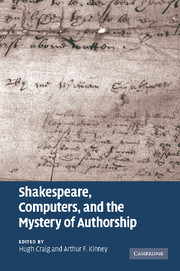Book contents
- Frontmatter
- Contents
- List of figures
- List of tables
- Notes on contributors
- Preface and acknowledgments
- 1 Introduction
- 2 Methods
- 3 The three parts of Henry VI
- 4 Authoring Arden of Faversham
- 5 Edmond Ironside and the question of Shakespearean authorship
- 6 The authorship of The Raigne of Edward the Third
- 7 The authorship of the Hand-D Addition to The Book of Sir Thomas More
- 8 The 1602 Additions to The Spanish Tragedy
- 9 Transforming King Lear
- Conclusion
- Appendix A Plays in the corpus
- Appendix B A list of 200 function words
- Glossary
- Index
- References
8 - The 1602 Additions to The Spanish Tragedy
Published online by Cambridge University Press: 06 January 2010
- Frontmatter
- Contents
- List of figures
- List of tables
- Notes on contributors
- Preface and acknowledgments
- 1 Introduction
- 2 Methods
- 3 The three parts of Henry VI
- 4 Authoring Arden of Faversham
- 5 Edmond Ironside and the question of Shakespearean authorship
- 6 The authorship of The Raigne of Edward the Third
- 7 The authorship of the Hand-D Addition to The Book of Sir Thomas More
- 8 The 1602 Additions to The Spanish Tragedy
- 9 Transforming King Lear
- Conclusion
- Appendix A Plays in the corpus
- Appendix B A list of 200 function words
- Glossary
- Index
- References
Summary
Thomas Kyd's The Spanish Tragedy is one of the most important early texts of the Elizabethan theatre, but details of its creation and early performances are sparse. It was probably written in the late 1580s. The first extant record, in Philip Henslowe's diary of theatre accounts, calls the play Jeronymo, after its main character, Hieronimo, and mentions a performance at the Rose Theatre in March 1592. The play was printed in 1592 and again in 1594 and 1599. Kyd died in 1594. There is no mention of the author of the play in the diary or in any of the early editions. Thomas Heywood was the first to associate The Spanish Tragedy with Kyd in print, in his Apology for Actors (1612).
By 1600 the copyright in the play had passed to Thomas Pavier. In 1602 he brought out an edition with some new passages. The title-page says that the play is ‘Newly corrected, amended, and enlarged with new Additions of the Painters part, and others, as it hath of late been diuers times acted’. There are five Additions. There is no indication of their author.
The first new section, fifty-four lines long, is inserted just after Hieronimo has discovered the body of his son Horatio. While in the earlier version of the play Hieronimo remains sane for some time after the murder, in this added passage he loses his wits temporarily and imagines that the body is someone else's, dressed in Horatio's clothes.
- Type
- Chapter
- Information
- Shakespeare, Computers, and the Mystery of Authorship , pp. 162 - 180Publisher: Cambridge University PressPrint publication year: 2009
References
- 8
- Cited by



